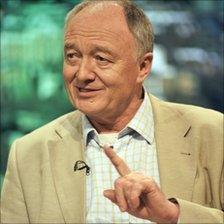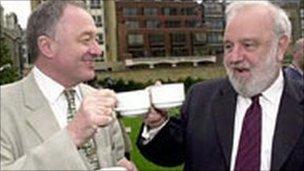Profile: Ken Livingstone
- Published

Mr Livingstone is aiming for his third term as London mayor
Ken Livingstone's selection as Labour candidate for the 2012 London mayoral election is the latest twist in a long and colourful career.
His was a household name before Tony Blair and Gordon Brown were elected as MPs, a time when both Prime Minister David Cameron and mayoral rival Boris Johnson were still Eton schoolboys.
The former MP first came to attention as leader of the Greater London Council (GLC) in 1981.
It coincided with a decade out of government for Labour, the party regarded by many as too left wing to be electable.
But his confrontational attitude towards political enemies made him a popular rebel figure.
When the Tories axed the GLC he became an MP for the first time, winning Brent East in1987.
New Labour setback
Yet prominent Labour figures regarded him as an unhelpful nuisance.
The arrival of Tony Blair on the scene in 1997 was another set-back for the well-known newt-fancier.
Mr Livingstone's left wing reputation did not sit easily with the New Labour project.
When it was announced London would have its first elected mayor, Mr Livingstone seemed a natural Labour choice for many.

Ken Livingstone went back on his word and stood against Frank Dobson
He had repeatedly promised not to stand against his party if he lost the battle for his party's nomination.
But Frank Dobson ended up winning the race for Labour's candidacy, heavily backed by the party leadership.
Mr Livingstone then went back on his word and stood as an independent, sweeping to victory.
He was to spend four years running London as an independent before he returned to the party.
Mr Blair, who had warned he would be a "disaster", said at the time: "I think I should be big enough to say the prediction I made has not turned out right."
Mr Livingstone's flagship mayoral project was the congestion charge, initially set up in central London then extended west.
'Cronyism' accusations
He fought - unsuccessfully - against the Labour government's plans for private partnership plans for the Tube.
But controversy soon reared its head.
In 2006 he was suspended from City Hall for four weeks after comparing a Jewish journalist to a concentration camp guard - and then refusing to apologise.
Mr Livingstone's chief race advisor, Lee Jasper, faced allegations about his involvement in the funding of black community groups.
Mr Jasper was eventually cleared and Mr Livingstone went on to win a second mayoral election.
But his second term was marked by criticism of inefficiency and waste.
Mr Livingstone was accused of "cronyism" after appointing several officials as special advisers on wages some thought excessive.
It was an issue Labour candidacy rival Oona King raised during this year's race for the nomination.
And a Channel 4 documentary claimed he drank alcohol during London Assembly question and answer sessions.
The 2008 election saw Boris Johnson enter the fray, arguably the first time Mr Livingstone had faced an opponent with a profile to rival his own.
It took place against the backdrop of New Labour's lowest ebb, with an embattled Gordon Brown engulfed in a row over the abolition of the 10p tax rate.
The Conservative candidate won with 1,168,738 first and second preference votes, compared with Mr Livingstone's 1,028,966.
Following a gruelling campaign, Mr Johnson paid tribute to Mr Livingstone.
But there will be no love lost between the pair as they gear up to do it all over again.
- Published24 September 2010
- Published24 September 2010
- Published20 September 2010
- Published10 September 2010
- Published11 July 2010